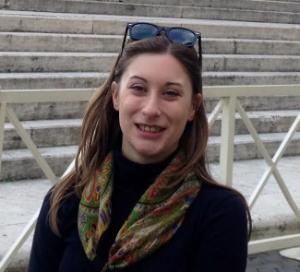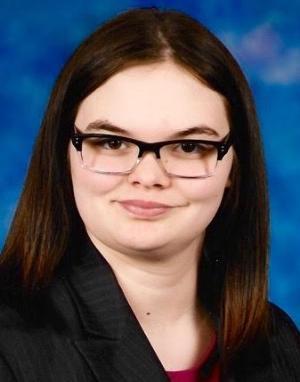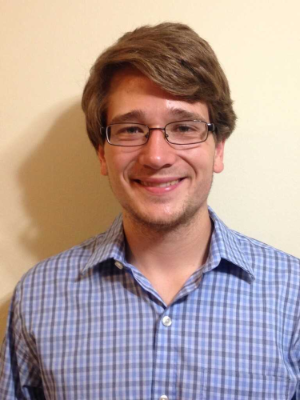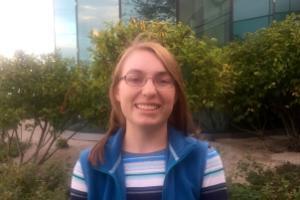archive
Student Spotlight: Internships
Experiential learning is at the core of the Loyola History Department’s educational experience. Undergraduate and graduate students put skills learned in Loyola classrooms to work with hands-on projects and internships throughout their time in the program. In Chicago and beyond, Loyola students participate in exciting internships that help build competencies and connections valuable for further education and future employment. Here, students Chelsea Denault, Sarah Eden, Andrew Haberman, and Kate Johnson share details from their internship experiences.
Chelsea Denault, PhD Candidate, Public History and United States History

Internship: Nantucket Historical Association Public Programs Intern, 2013
What types of responsibilities did your internship entail? At the NHA, my main responsibility was coming up with future program ideas, thinking about plans for implementation, and determining potential community partners. Once a week, I was also responsible for running a mobile artifact cart - called the ArtifACK Cart (ACK is the airport code for the island) - which was my favorite thing! The purpose of the ArtifACK Cart was to engage with kids about whales and whale anatomy, which complemented the museum's main narrative discussing Nantucket's importance in the whaling industry during the 18th and 19th centuries. I was also responsible for managing some of our ongoing art programs at other historic
sites and working with the entire Public Programs team on some of our bigger programs, like a full in-museum production of Orson Welles' Moby Dick Rehearsed. It was a great combination of creative office work, engaging with the public, and providing support to the Programs Team.
What did you learn from the experience? I learned a lot about planning a project from beginning to end, thinking through the steps and stakeholders along the way. It really got me thinking not just about the idea behind a public program, but also the why and the how. A project might sound interesting, but if it doesn't support the institution's mission (the why) and it takes too many resources (the how), it might not be worth your time or the institution's time. I also learned a lot about myself and my professional goals through this internship. I realized working at the NHA that I was most passionate about community-based or collaborative project, which was not a major priority for the museum. So my experience really helped me understand the importance of looking closely at an institution’s mission and values. At the same time, the internship also taught me a valuable sense of realism: you can dream big on a program or project, but you really need to understand what your museums needs and expects first!
How did your work at Loyola help prepare you for your internship? The Museums course really gave me the skills and the inspiration to approach my internship, We discussed many examples of innovative or off-the-wall programs and exhibits that taught me to think outside the box, which was really valuable for this position. And because we actually planned multiple exhibits in that class, it also taught me the methodical, day-to-day details of how you plan and execute a project. Most of all, for this experience and my other internships since then, my course work at Loyola has firmly centered the importance of audience - thinking about your audience, who they are, what their expectations are, what they might know, and how best to reach them in a meaningful or effective way.
Sarah Eden, Class of 2020

Internship: Pritzker Military Museum & Library, Spring 2016.
What types of responsibilities did your internship entail? I was a transcriber, so I listened to recorded testimonies from military veterans about their experience in the military as well as conducted my own interview with a military veteran. As I listened to these primary sources, I typed what I heard and posted the completed transcript onto an online database which houses hundreds of other testimonies from veterans. My responsibilities included listening to about 6 testimonies from military veterans and transcribing the content through a specific computer program. Additionally, towards the end of my internship, I had the privilege of interviewing a relative of mine. I came up with relevant questions to ask as well as conducted the interview myself.
What did you learn from the experience? I definitely learned effective listening skills that help sharpen my ability to pick up small yet important details when listening to lectures, videos, or any other recorded audio. Moreover, conducting an interview with a veteran definitely increased my respect and admiration for any person who enlists in the military and experiences war. My experience at the Pritzker really allowed me to realize that military history is my passion and is something I wish to pursue. I also polished up my typing skills.
How has your work at Loyola related to your internship? I completed this internship before my freshman year at Loyola; however, upon growing as a student at Loyola University Chicago, I can definitely say my experience helped me cultivate effective examination skills, critical thinking ability, and the dedication to pursue what I love most.
Andrew Haberman, Class of 2017

Internship: Glessner House Museum Collections Specialist, August-December 2017 (Ongoing)
What types of responsibilities did your internship entail? As a Collections Specialist, I have a few main responsibilities. The day-to-day work varies, since the museum has a wide variety of objects, but the general nature of my job is to assign recently acquired object an ID number, photograph them, and enter them into the museum database. Upon completion of a major project, I usually write an article for the Glessner House website to share my work.
What did you learn from the experience? The most important thing that I have learned from the internship is how my history background can be used in the workforce. Being a history major is much more than memorizing facts, and my critical analysis and writing skills are invaluable to my job at the museum. Working at the Glessner House has allowed me to put these skills to the test, and it has also allowed me to see the connection between the past and the present.
How did your work at Loyola help prepare you for your internship? As stated above, the development of critical thinking skills and writing has had the largest impact on my job. In carefully documenting many different types of objects, clarity is of the utmost importance. I also used my research skills for writing the articles for the website. I would not have had any of these skills if it weren't for the numerous projects and papers I have been assigned at Loyola that challenged me to think outside the box about history.
Kate Johnson, MA Candidate, Public History

Internship: Frances Willard House Museum, Prohibition Trust Intern, Summer 2017
What types of responsibilities did your internship entail? In my position I worked with the director managing museum finances, working with donor and museum membership communications, giving tours, event planning, and researching and drafting a special architectural program.
What did you learn from the experience? The internship really helped me fill in some gaps in my experience in the financial side of museum work, as well as gain insight into the kinds of decisions directors face. Interning at a small museum meant that I got exposure to just about every aspect of museum work that I was interested in (and some that I was not), as well as the particular challenges small institutions face.
How did your work at Loyola help prepare you for your internship? Loyola's Public History courses all emphasize project management skills, which was helpful in my internship as I was juggling multiple projects.
